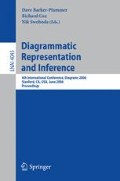Abstract
Two studies evaluated the effectiveness of Euler circles in aiding participants in drawing conclusions to deductive reasoning problems. The problems were the ones that typically cause reasoners the most difficulty because their prior beliefs about conclusions interfere with their judgments of deductive validity. The use Euler circles reliably contributed to reasoners’ inability to solve the problems. This pattern was shown for both young, university students and elderly retired people.
Access this chapter
Tax calculation will be finalised at checkout
Purchases are for personal use only
Preview
Unable to display preview. Download preview PDF.
References
Calvillo, D.P., Revlin, R.: The role of similarity in deductive categorical inference. Psychonomic Bulletin & Review. Special Issue: Memory strength and recency judgments 12, 938–944 (2005)
Ekstrom, R.B., French, J.W., Harman, H.H.: Kit of factorreferencedcognitivetests, Educational Testing Service, Princeton, NJ (1976)
Evans, J.St.B.T., Newstead, S.E., Byrne, R.M.J.: Human Reasoning: The psychology of deduction. Lawrence Erlbaum Associates, Hove (1993)
Evans, J.St.B.T.: Bias in human reasoning: Causes and consequences. Erlbaum, Hillsdale (1989)
Evans, J.St.B.T., Barston, J.L., Pollard, P.: On the conflict between logic and belief in syllogistic reasoning. Memory & Cognition 11, 295–306 (1983)
Henle, M.: On the relation between logic and thinking. Psychological Review 69, 366–378 (1962)
Johnson-Laird, P.N.: Mental models: Towards a cognitive science of lanuage, inference and consciousness. Cambridge University Press, Cambridge (1983)
Johnson-Laird, P.N., Byrne, R.M.J.: Deduction. Erlbaum, Hillsdale (1991)
Klauer, K.C., Musch, J., Naumer, B.: On the belief bias in syllogistic reasoning. Psychological Review 107, 852–884 (2000)
Newell, A.: Reasoning, problem solving and decision processes: The problem space as a fundamental category. In: Nickerson, R. (ed.) Attention and Performance, vol. 8, Erlbaum, Hillsdale (1981)
Revlin, R., Leirer, V.O.: The effects of personal biases on syllogistic reasoning: Rational decisions from personalized representations. In: Revlin, R., Mayer, R.E. (eds.) Human reasoning, Winston, Washington (1978)
Revlin, R., Leirer, V.O., Yopp, H., Yopp, R.: The belief-bias effect in formal reasoning: The influence of knowledge on logic. Memory & Cognition 8, 584–592 (1980)
Revlis, R.: Two models of syllogistic reasoning: Feature selection and conversion. Journal of Verbal Learning and Verbal Behavior 14, 180–195 (1975)
Rips, L.: The Psychology of Proof. MIT Press, Cambridge (1994)
Rizzo, A., Palmonari, M.: The mediating role of artifacts in deductive reasoning. In: The 2005 Cognitive Science Society, Stresa, Italy (2005)
Salthouse, T.A., Mitchell, D.R.: Effects of age and naturally occurring experience on spatial visualization performance. Developmental Psychology 26, 845–854 (1990)
Sloman, S.A.: Categorical inference is not a tree: The myth of inheritance hierarchies. Cognitive Psychology 35, 1–33 (1998)
Wilkins, M.C.: The effect of changed material on the ability to do formal syllogistic reasoning. Archives of Psychology 102, 1–83 (1928)
Author information
Authors and Affiliations
Editor information
Editors and Affiliations
Rights and permissions
Copyright information
© 2006 Springer-Verlag Berlin Heidelberg
About this paper
Cite this paper
Calvillo, D.P., DeLeeuw, K., Revlin, R. (2006). Deduction with Euler Circles: Diagrams That Hurt. In: Barker-Plummer, D., Cox, R., Swoboda, N. (eds) Diagrammatic Representation and Inference. Diagrams 2006. Lecture Notes in Computer Science(), vol 4045. Springer, Berlin, Heidelberg. https://doi.org/10.1007/11783183_27
Download citation
DOI: https://doi.org/10.1007/11783183_27
Publisher Name: Springer, Berlin, Heidelberg
Print ISBN: 978-3-540-35623-3
Online ISBN: 978-3-540-35624-0
eBook Packages: Computer ScienceComputer Science (R0)

